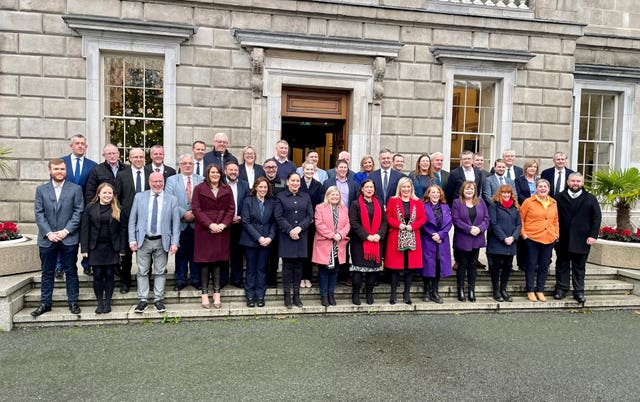
Sinn Fein leaders have insisted their party’s performance in Ireland’s General Election is not a setback for the campaign for Irish reunification.
Party leader Mary Lou McDonald had vowed to deliver a step change in the drive for constitutional change if Sinn Fein entered government and she became taoiseach.
The odds of either of those scenarios coming to pass following Friday election now look extremely slim, with Fianna Fail and Fine Gael expected to re-enter another coalition government in Dublin, leaving Sinn Fein facing another five years as the Dail’s main opposition party.
Fianna Fail won 48 seats in the election, with Sinn Fein taking 39 and Fine Gael securing 38.

Fianna Fail also took the most first preference votes in the proportional representation election, securing 21.9% to Fine Gael’s 20.8%.
Sinn Fein came in third on 19%.
While Sinn Fein’s vote share represented a marked improvement on its disappointing showing in June’s local elections in Ireland, it is still significantly down on the 24.5% poll-topping share it secured in the 2020 general election.
Ms McDonald and vice-president Michelle O’Neill, who is Northern Ireland’s First Minister, met Sinn Fein’s new-look team of TDs at Leinster House on Wednesday.
Afterwards, they were both asked by reporters if the election result was a setback for their Irish unity project.
“No, far from it,” replied Ms McDonald.
“As a matter of fact, it was interesting during the election campaign the number of parties that set out actually very ambitious targets and ideas around reunification, the democratic conversation. So, far from it. I think it’s still very much game on.”
Ms O’Neill added: “Absolutely, we just now returned with 39 TDs, the largest ever team of Sinn Fein in the Dail.
“I think that speaks volumes in terms of our project and what we want to achieve.”


Why are you making commenting on The Herald only available to subscribers?
It should have been a safe space for informed debate, somewhere for readers to discuss issues around the biggest stories of the day, but all too often the below the line comments on most websites have become bogged down by off-topic discussions and abuse.
heraldscotland.com is tackling this problem by allowing only subscribers to comment.
We are doing this to improve the experience for our loyal readers and we believe it will reduce the ability of trolls and troublemakers, who occasionally find their way onto our site, to abuse our journalists and readers. We also hope it will help the comments section fulfil its promise as a part of Scotland's conversation with itself.
We are lucky at The Herald. We are read by an informed, educated readership who can add their knowledge and insights to our stories.
That is invaluable.
We are making the subscriber-only change to support our valued readers, who tell us they don't want the site cluttered up with irrelevant comments, untruths and abuse.
In the past, the journalist’s job was to collect and distribute information to the audience. Technology means that readers can shape a discussion. We look forward to hearing from you on heraldscotland.com
Comments & Moderation
Readers’ comments: You are personally liable for the content of any comments you upload to this website, so please act responsibly. We do not pre-moderate or monitor readers’ comments appearing on our websites, but we do post-moderate in response to complaints we receive or otherwise when a potential problem comes to our attention. You can make a complaint by using the ‘report this post’ link . We may then apply our discretion under the user terms to amend or delete comments.
Post moderation is undertaken full-time 9am-6pm on weekdays, and on a part-time basis outwith those hours.
Read the rules hereLast Updated:
Report this comment Cancel